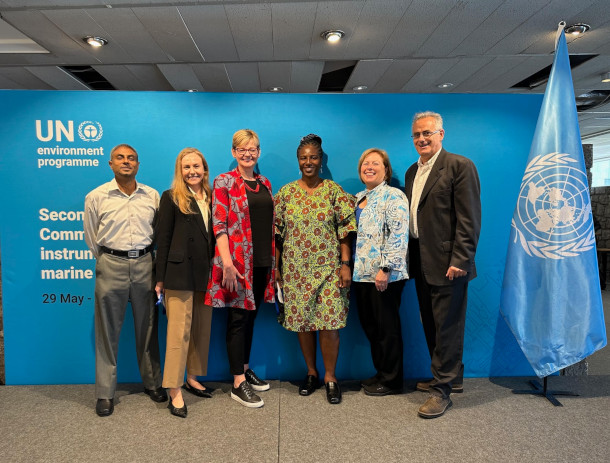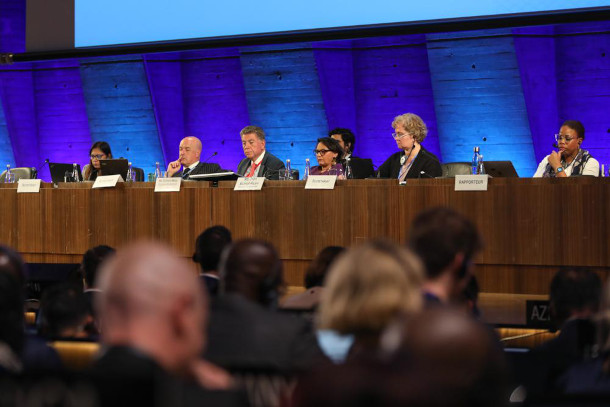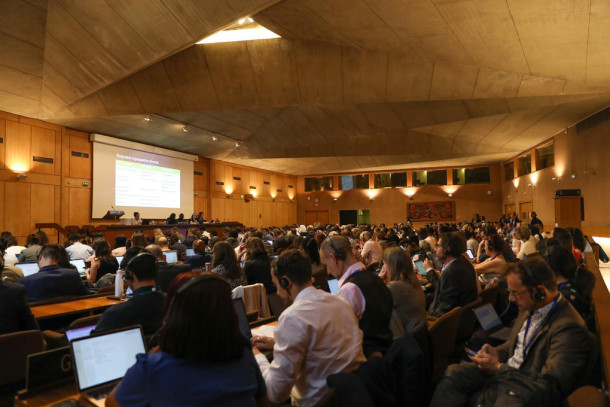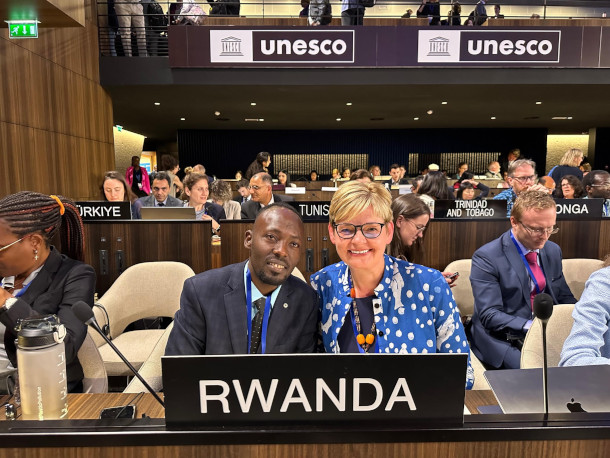A World Without Plastic Pollution
Air Date: Week of June 9, 2023

UN delegates of the International Science Council gathered in Paris at the Intergovernmental Negotiating Committee on Plastic Pollution. Pictured from left to right are Kishore Boodhoo, Anda Popovici, Maria Ivanova, Adetoun Mustapha, Margaret Spring, Stefano Aliani. (Photo: Courtesy of Maria Ivanova)
2,000 people from across the globe recently gathered in Paris to work towards a UN treaty to eliminate plastic pollution. Maria Ivanova, the Director of the School of Public Policy and Urban Affairs at Northeastern University, took part in the Paris talks and joins Host Aynsley O’Neill to paint a picture of a world with far less plastic and how we can get there.
Transcript
CURWOOD: It’s Living on Earth, I’m Steve Curwood.
O’NEILL: And I’m Aynsley O’Neill.
Most of the 10 billion tons of plastic ever produced has ended up in a landfill or polluting the oceans and land, according to the United Nations Environment Programme. But the good news is that the world’s nations are working on a UN treaty to eliminate plastic pollution, and 2,000 people from across the globe recently gathered in Paris to lay the foundation for that agreement. Maria Ivanova is the Director of the School of Public Policy and Urban Affairs at Northeastern University and she took part in the Paris Talks as a representative of the International Science Council. She recently returned from Paris and joins us now. Welcome back to Living on Earth, Maria!
IVANOVA: Thank you very much for having me.
O'NEILL: And as we record, you are joining us fresh from that 2023 conference in Paris, can you tell us a little bit about what the mood was like there? You know, don't paint us a picture.
IVANOVA: Paint a picture of Paris and plastics. One, you start by Air France, the minute you sit on an airplane and you receive your meal, you feel that something has changed. Usually, when we are on a plane, at least I personally have always reacted against all the plastic cups, the plastic utensils, the trays, all of the stuff that comes for a single use on an airplane. Air France, most of it is paper, there are no trays even and there are no plastic cups anymore, because the government has passed public policy on plastics. And I think this is at the core of what this treaty is about, is creating new public policy on plastics. And so seeing how one country can change its public policy on plastics and you see the effects immediately throughout the conference venue on Air France, in the store, has been something that actually is changing the mood toward a greater and greater ambition.
O'NEILL: So what elements is the treaty expected to contain? Is it just something like that and to single use plastics? Or are there additional aspects that are going on?

The Intergovernmental Negotiating Committee on Plastic Pollution aims to draft a treaty by 2024 that would reduce plastic pollution by 80% by 2040. (Photo: IISD/ENB | Kiara Worth)
IVANOVA: So it's that's very good question, because you phrased it as what is expected? Let me tell you what it should contain because as you can imagine, governments will be negotiating, they are negotiating what should be in the treaty, what could be in annexes what could be in protocols, what needs to be left up to countries to decide at the national level, but ultimately, the goal of the treaty is clear: eliminate, not reduce, eliminate plastic pollution, by 2040. A very ambitious goal with a very ambitious timeline. So, the elements that a treaty could, should contain are let's say fivefold. One, put a price on plastics, we need to put a price on plastics that reflects the true cost of plastics. Two, is the responsibility for the end of life of plastics, we need the producer responsibility, extended producer responsibility, who takes it at the end of life. Three, design policies on plastics, these in the treaty negotiations are called control measures. How do you control for plastics? But ultimately, how do you design? How do you imagine these plastics, these polymers that are using fewer chemicals that are easier to reuse, and that are better to recycle? Fourth, waste management, how do we create proper waste management policies and practices? And five, the monitoring and reporting. How do we ensure that this treaty is adhered to? How do companies report how the countries report? And how do we ensure that the monitoring is there, so that we know who is doing what. But then underlying all of this is the need for a robust financing mechanism that would allow some countries to catch up as they need to, others to excel, and we enable their industries, their companies to do better and better until we reach that ambitious target.
O'NEILL: Well when think about, you know, sort of international treaties that can actually do something, I think a lot of us will think about the Montreal Protocol, which reversed that ozone layer crisis that was so prevalent. What can be learned from the success with that treaty in relation to plastic pollution?

The Intergovernmental Negotiating Committee on Plastic Pollution has focused on cleaning up ‘legacy pollution’ which is pollution that already exists. (Photo: IISD/ENB | Kiara Worth)
IVANOVA: Enforcement of international law is an issue. It's an issue, not only in plastics. Every international legal agreement struggles with what is the enforcement mechanism. An example like the Montreal Protocol, the one problem, the one global problem, we have resolved successfully, it is the depletion of the ozone layer. That depletion has been reversed. How did that happen? It happened because one, science put it on the agenda and was engaged in creating the global treaty. Two, countries agreed to an ambitious global treaty that set a goal but also allowed different countries to meet their obligations at different times stages. And three, because it had the necessary financial mechanism and institutional mechanisms. And so, if we put in place the kind of institutional support, financial support that would enable countries to comply with the treaty, we will do the enforcement before enforcement is necessary, we will have effective implementation.
O'NEILL: The fossil fuel industry and the plastics industry are intricately connected. What was the presence of the fossil fuel industry at this conference?
IVANOVA: The fossil fuel industry was present in the narratives of all of us saying 98% of plastics are produced out of fossil based raw materials. But the fossil fuel industry did not take the floor, the fossil fuel industry did not make any specific requirements. It was the countries that produce fossil fuels that actually had interventions that one would say, were predetermined or shaped by or colored by the heavy reliance of these countries, on their fossil fuel industries. Of course, fossil fuel industries have to think about their bottom line, but also about what happens when they produce plastics. And ultimately, I think the innovation of how do we produce plastics, because this treaty will not be to eliminate plastic. This is a treaty to eliminate plastic pollution. We rely on plastics for so much of the operations in our daily lives and yet, there are a lot of plastics that we can live without. So there will continue to be a need to demand for the use of plastics, however, where the fossil fuel industry, and indeed where academia, science will be very important is in designing products, plastic products, that are one reusable, multiple times, in ways that do not harm human health, and two recyclable easily in a way that will then ensure that recycling is almost automatic, that we do not have one thousand different products, using one thousand different polymers and cannot be easily recyclable. So I would say the fossil fuel industry should have an interest in a positive outcome and could mobilize its innovation capacity to actually create the kind of processes, procedures, policies, and practices that would enable the effective use of plastics, the effective recycling of plastics, and ultimately, the elimination of pollution by plastic.

Maria Ivanova consulted with Rwanda at the Intergovernmental Negotiating Committee on Plastic Pollution in Paris. (Photo: Courtesy of Maria Ivanova)
O'NEILL: How is the treaty going to balance out those two completely different situations of some countries that are contributing more, some countries that are contributing less, some that are impacted more some that are impacted less?
IVANOVA: Well, there's always going to be differentiation in terms of who produces and who bears the brunt of the pollution from that. Indeed, living in the United States, we see how much we produce, and how much of it is exported to countries for so called recycling, that do not necessarily have either the capabilities or the spaces to do that recycling. So a global treaty will set the goal for what we need to do, and it will set obligations for what producers have to do, for what consumers should do or not be expected to do for example, with extended producer responsibility, the brunt will be taken off of the consumers. And then there are countries and this is something I want to emphasize, there are countries that are small, that are relatively poor, like Rwanda, for example, that have taken a leadership position, because they have seen the importance of the problem, they have seen the various opportunities to act and resolve it and they have done so. So the whole resolution on plastic pollution came from the leadership of two countries, Peru and Rwanda, two small states who bear the brunt of plastic pollution rather than big producers. They have also shown how one can go to the market without a plastic bag, how you can have a society that does not rely on single use plastics. And as I mentioned in the very beginning, now France is doing that. So I think a global treaty will set that baseline that everybody will know not only is this necessary, but it is possible.
O'NEILL: Maria Ivanova is the Director of the School of Public Policy and Urban Affairs at Northeastern University. Maria, thank you so much for taking the time with us today.
IVANOVA: Thank you very much for having me.
Links
Learn more about the Intergovernmental Negotiating Committee on Plastic Pollution
The Guardian | “First steps agreed on plastics treaty after breakthrough at Paris talks”
Living on Earth wants to hear from you!
Living on Earth
62 Calef Highway, Suite 212
Lee, NH 03861
Telephone: 617-287-4121
E-mail: comments@loe.org
Newsletter [Click here]
Donate to Living on Earth!
Living on Earth is an independent media program and relies entirely on contributions from listeners and institutions supporting public service. Please donate now to preserve an independent environmental voice.
NewsletterLiving on Earth offers a weekly delivery of the show's rundown to your mailbox. Sign up for our newsletter today!
 Sailors For The Sea: Be the change you want to sea.
Sailors For The Sea: Be the change you want to sea.
 The Grantham Foundation for the Protection of the Environment: Committed to protecting and improving the health of the global environment.
The Grantham Foundation for the Protection of the Environment: Committed to protecting and improving the health of the global environment.
 Contribute to Living on Earth and receive, as our gift to you, an archival print of one of Mark Seth Lender's extraordinary wildlife photographs. Follow the link to see Mark's current collection of photographs.
Contribute to Living on Earth and receive, as our gift to you, an archival print of one of Mark Seth Lender's extraordinary wildlife photographs. Follow the link to see Mark's current collection of photographs.
 Buy a signed copy of Mark Seth Lender's book Smeagull the Seagull & support Living on Earth
Buy a signed copy of Mark Seth Lender's book Smeagull the Seagull & support Living on Earth

